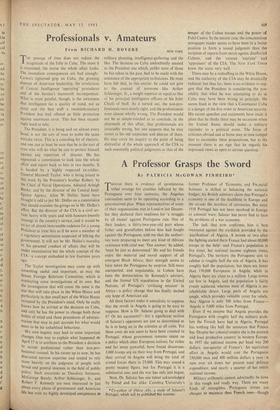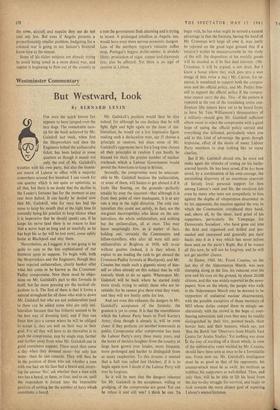A Professor Grasps the Sword
By PATRICIA McGOWAN PINHEIRO*
THOUGH there is evidence of spontaneous tribal revenge for cruelties inflicted by the Portuguese over four centuries, the Angolan nationalists seem to be operating according to a preconceived plan. When representatives of some of their organisations met in Lond.m last Decem- ber they declared their readiness for 'a struggle by all means' against Portuguese rule. One of their leaders, a thirty-two-year-old poet whose father and grandfather_ before him had fought against the Portuguese, told me that the authori- ties were preparing to meet any kind of African resistance with total war. 'Our answer,' he added, 'must be just as determined.' He and his friends enjoy the material and moral support of all emergent Black Africa; their strength seems to have taken the Portuguese by surprise. Still more unexpected, and unpalatable, in Lisbon have been the denunciation by Kennedy's advisers, and the formal US repudiation in the United Nations, of Portugal's 'civilising mission' in Africa—a policy change that has finally dashed any hope of American aid.
All these factors make it unrealistic to suppose that the revolt in Angola is going to be easy to suppress. How is Dr. Salazar going to deal with it? Or his successors?—for a significant section of Salazar's opponents are just as determined as he is to hang on to the colonies at all costs. Yet these costs do not seem to have been counted in Portugal, whose government remains intent on a policy which other European nations, far richer and far more powerful, have found disastrous. 8,000 troops are on their way from Portugal. and their arrival in Angola will bring the total of armed forces there to 25,000. This may sound a pretty modest figure, but for Portugal it is a substantial one; and the war has only just begun. Now, Dr. Salazar has one talent acknowledged by friend and foe alike. Coimbra 'University's • Co-author of Oldest Ally, a study of Salazar's Portugal, which will be published this summer. former Professor of 'Economic and Fit.Ancial Sciences is skilled at balancing the national budget; his British admirers claim that Portugal's economy is one of the healthiest in Europe and the escudo the sturdiest of currencies. But since 1918 Portugal has not been involved in foreign or colonial wars; Salazar has never had to face the problems of a war economy.
The task that now confronts him is best measured against the yardstick provided by the 'pacification' of Algeria. A month or two after the fighting started there France had about 80,000 troops in the field—and France's population is five times, her national income eighteen times, Portugal's. The territory the Portuguese aim to subdue is roughly half the size of Algeria. It has roughly half the population; but there are fewer than 150,000 Europeans in Angola, while in Algeria there are close to a million. Large towns are few in Angola, and the population is fairly evenly scattered, whereas most of Algeria is un- inhabitable desert. Large parts of Angola are jungle. which provides valuable cover for rebels. And Algeria is only 500 miles from France— Angola is 5,000 miles from Portugal.
Even if we assume that Angola provides the Portuguese with roughly half the military prob- lem the French have had in Algeria, Portugal has nothing like half the resources that France has. Despite her colonial empire she is the poorest and least productive country in western Europe. In 1957 the national income per head was 200 dollars, one-quarter of France's. An equivalent effort in Angola would cost the Portuguese 250,000 men and 400 million dollars a year—a sum over six times her present total defence expenditure. and nearly a quarter of her entire national income.
Military arithmetic cannot, admittedly. be done in this rough and ready way. There are many kinds of intangibles. Portuguese troops are cheaper to maintain than French ones—though the arms, aircraft and napalm they use do not cost any less. But even if Angola presents a proportionately smaller problem, budgeting for a colonial war is going to tax Salazar's financial know-how to the utmost.
Some of his richer subjects arc already trying to avoid being taxed in a more direct way, and capital is beginning to flow out of the country at a rate the government finds alarming and is trying to lessen A prolonged rebellion in Angola, too, would have even more serious economic dangers. Loss of the northern region's valuable coffee crop, Portugal's biggest dollar-earner, is already likely; production of sugar, copper and diamonds may also be affected. Yet there is no sign of caution in Lisbon.







































 Previous page
Previous page